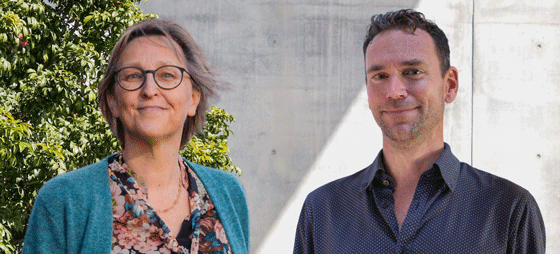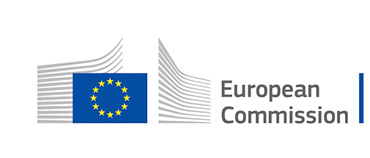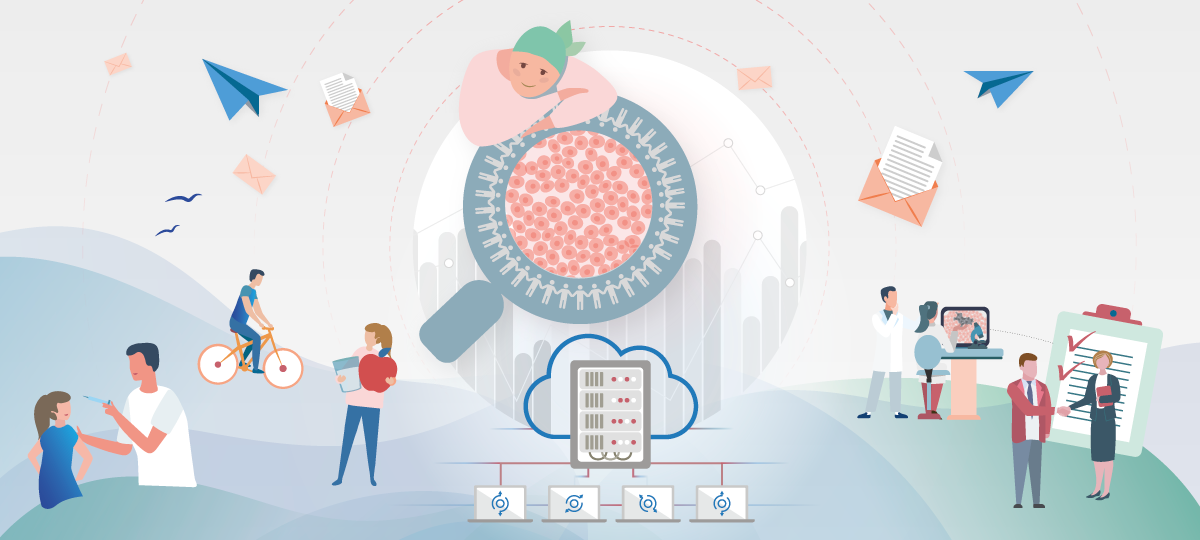|
|

|

|
| |
|
|

|
Knowledge Centre on Cancer: Tackling Cancer and other Non-communicable diseases (NCDs)
Issue 8, April 2025
|
|
|
|
|
|
|
|
|
Introduction
|
|
|
|
|
Guest corner
|

|
The Backbone of Cancer Control: European Cancer Registries
|
Cancer is deeply personal. It is a reality that touches families, friends, and communities across Europe. And yet, to understand and combat cancer effectively, we must also take a broader view — one that looks at populations and recognizes patterns, disparities, and progress.
This month, the European Cancer Information System (ECIS) released its latest cancer incidence figures in collaboration with the European Network of Cancer Registries (ENCR).
From the ECIS data, we know that 2.7 million people were diagnosed with cancer in 2022 in the EU. These numbers are more than data points; they tell the story of millions of lives affected by cancer and highlight the need for action to better control cancer and reduce inequalities.
|

|
|
Liesbet van Eycken, Belgium Cancer Registry
Gijs Geleijnse, Netherlands Cancer Registry, IKNL
Co-Chairs of the European Network of Cancer Registries (ENCR)
|

|
|
|

... Read more
|

|
|
|
|
|
Science News and Publications
|
|
|
Updated European Cancer Information System
|
|
|
The European Cancer Information System (ECIS) website has been revamped with new data and a fresh interface, providing a powerful tool for policymakers, researchers, and healthcare professionals to inform cancer control strategies. The platform offers insights into the latest geographical and temporal trends in cancer incidence and mortality across Europe, enabling comparisons between countries and regions.
|
|
|
|
|
|
Prevention of overweight and obesity in children brief published on Knowledge Gateway
|
|
|
Childhood pre-obesity and obesity are complex issues influenced by a range of factors, including biological, environmental, and socioeconomic elements. These conditions can significantly impact a child’s health and quality of life, both now and in the future. What role can policies play in addressing these contributing factors? Find out in the latest brief from the Health Promotion and Disease Prevention Knowledge Gateway.
|
|
|
|
|
|
|
The European Breast Cancer Guidelines adapted into Chinese practice guidelines
|
|
|
The European breast cancer guidelines provide evidence-based, up-to-date recommendations for breast cancer screening and diagnosis, accompanied by a quality assurance scheme for breast cancer services and aim to ensure equitable breast cancer services in Europe.
However, did you know these can be adapted to other settings, also outside Europe? Recently the guidelines have been adapted to the Chinese context by the Chinese Anti-Cancer Association, with 230,000 members nationally in 31 provinces and cities across China.
The JRC has previously contributed to the adaption of the guidelines to the Italian and Tunisian context.
Get in touch with us at: JRC-CANCER-POLICY-SUPPORT@ec.europa.eu to find out more.
|
|
|
|
|
|
New indicators on the European Cancer Inequalities Registry- Regional Disparities in cancer mortality
|
|
|
The European Cancer Inequalities Registry (ECIR) has just published 8 new indicators and a new topic in its Data Tool: Regional disparities in cancer mortality within countries for seven cancer sites and for all cancers combined. With the publication of these indicators, ECIR meets its objective: to highlight disparities, gaps and inequalities not only between countries, but also within countries (EU27, Iceland and Norway).
The European Commission is committed to reducing regional disparities in cancer mortality across EU Member States, for example, by improving patient access to cancer prevention and care for those living in remote and rural areas, for instance through the Joint Actions EUnetCCC and eCan.
|
|
|
|
|
Blog: Rethinking cancer classification: from organ of origin to molecular epidemiology
|
|
|
The landscape of cancer treatment is rapidly evolving, with an increasing number of personalised therapies targeting specific molecular structures on cancer cells or genetic mutations. However, the current approach to classifying anti-cancer drugs and designing clinical trials is largely based on the organ of origin, which can limit patient access to effective treatments.
|
|
|
|
World Cancer Research Fund International launched a new report on the role of dietary and lifestyle patterns for cancer prevention
|
|
|
The report highlights that examining dietary and lifestyle patterns (DLPs) as a whole, rather than individual foods or habits, offers better insight into reducing cancer risk. An independent expert panel reviewed global evidence linking DLPs to breast and colorectal cancer, leading to a new recommendation for a cancer-preventive DLP.
|
|
|
|
|
New certified reference material to improve the accuracy and reliability of liver disease diagnosis
|
|
|
The European Commission’s Joint Research Centre (JRC) has released a new certified reference material (CRM) for the enzyme aspartate transaminase (AST). Elevated levels of AST in blood tests are associated with several liver disorders, (including hepatitis, fatty liver disease and liver cancer) which are a significant public health concern affecting millions of people worldwide. Early detection and accurate diagnosis are critical for effective treatment and improving patient outcomes. By providing a CRM for AST, the JRC is helping to improve the accuracy and reliability of liver disease diagnosis, ultimately leading to better patient outcomes.
|
|
|
|
Publication: Quick buys for prevention and control of noncommunicable diseases
|
|
|
A new WHO/Europe paper identifies 25 proven, cost-effective interventions to accelerate health progress. Published in Lancet Regional Health – Europe, the paper highlights "quick buys" that can deliver public health impact within five years. It emphasizes comprehensive approaches to chronic diseases while acknowledging the challenges faced by health ministries. The findings guide policy-makers in aligning interventions with short-term political cycles, supporting progress toward the 2030 NCD mortality reduction target.
|
|
|
|
|
|
|
|
|
|
|
Policy news
|

|
President von der Leyen in South Africa to strengthen the strategic partnership and boost trade and investments
|
|
13 March 2025, Cape Town, South Africa
|
|
|
|
|
|

|

|
Speech by EU Commissioner Várhelyi following the Informal meeting of Health Ministers
|
|
25 March 2025, Warsaw, Poland
|

|
|
If you look at the latest figures that we have just published a month ago, what you will find is that in the last 10 years, the number of young suffering from diabetes and obesity has doubled. We're talking about 20% on average of the population of the young generation suffering from either of these conditions or both. It means that in 10, 15 years from now, we will have a whole generation with this condition of having cardiovascular diseases.
|

|
|
|
|
|

|

|
Eurohealth publication: Advancing the EU Cancer Mission through policy dialogues
|
|
A special issue of Eurohealth, the journal of the European Observatory on Health Systems and Policies, published on 12 March, highlights the EU Mission on Cancer and its crucial role in tackling Europe's rising cancer burden. The issue presents insights from key stakeholders on advancing cancer prevention, care, and research across Europe, including a perspective on Europe's Beating Cancer Plan and how it works in tandem with Mission. Featuring diverse perspectives on overcoming challenges and strengthening policies, this edition aims to drive meaningful discussions on cancer control.
|
|
|
|

|

|
European Health Data Space (EHDS) Regulation entered into force
|
|
The European Health Data Space (EHDS) Regulation marks a major step in transforming healthcare across the EU. By establishing a secure framework for accessing and sharing electronic health data, EHDS will enhance patient care, accelerate research and foster digital innovation while ensuring strong privacy protections.
|
|
|
|

|

|
Launch of the MEP Interest Group on Health Inequalities, Prevention and Risk Factors
|
|
On Tuesday, 18 February, public health leaders gathered to discuss how to continue support to health promotion and disease prevention for the current EU mandate. The event marked the launch of the Interest Group on Health Inequalities, Prevention, and Risk Factors. It was attended by MEPs, Member State representatives, including the Joint Action Prevent NCDs, the World Health Organization, and civil society.
|
|
|
|

|

|
Launch of MEP Cardiovascular Health Group
|
|
The group held its first meeting on 23 April in the European Parliament. During this meeting, MEPs had the opportunity to connect with the partners of the European Alliance for Cardiovascular Health (EACH), learn about the work programme for the year, and take part in the launch of a new publication by the Alliance, titled A European Cardiovascular Health Plan: The Roadmap.
|
|
|
|

|

|
Answer given by Mr Várhelyi on behalf of the European Commission to the question: Effective gastric cancer screening in the EU
|
|
31 March 2025
|

|
|
The Commission has been providing funding through the EU4Health Programme to the projects EUROHELICAN and TOGAS.
They aim to help policymakers across the EU to incorporate gastric cancer screening into their healthcare priorities and balance effectiveness, feasibility and acceptability with potential adverse long-term effects.
Additionally, through the Joint Action EUCanScreen, a pilot study will look into the feasibility of integrating gastric cancer screening into colorectal cancer screening programmes.
The EU4Health-funded project CAN.HEAL is focusing on the implementation of genomics and personalised medicine in clinical practice, including non-invasive screening methods, such as next-generation sequencing and liquid biopsy.
|

|
|
|
|
|

|

|
The Scientific Advice Mechanism – Outputs and impacts
|
|
The Commission published a report on the last five years’ activities of the Scientific Advice Mechanism (SAM), covering the period 2020-2024.
|
|
|
|

|

|
Questions and answers on the Critical Medicines Act
|
|
The Critical Medicines Act is an industrial policy toolbox to protect patients and boost manufacturing capabilities. It complements the EU's pharmaceutical reform and enhances the European Medicines Agency's role in managing shortages. The Act seeks to reduce critical medicine shortages, improve supply security, and address supply chain vulnerabilities. It also aims to reduce Europe's dependency on single suppliers and ensure broader access to medicines across EU countries.
|
|
|
|
|
|
|
Open calls for funding
|

|
New call for tenders for guidelines development training for EC initiatives on breast, colorectal, cervical, lung, prostate and gastric cancer
|
|
|
|
|
|

|

|
European Digital Innovation Hubs - Associated countries (EDIHs with reinforced AI focus)
|
|
|
|
|
|
|
|
|
Recently started EU-funded projects
|

|
EU-funded cancer projects that started between March and April 2025
|
Projects
Check out the synergies between EU-funded cancer projects on the Cancer projects tool.
|
|
|
|
|
Upcoming events
|

|
EU4Nutrition Nutritional Care Policy Summit, free live stream, 10:00-14:15 CEST
|
|
|
|
|
|

|

|
6th Annual Meeting of the European Society for Peadiatric Oncology 2025, Budapest, Hungary
|
|
|
 |
 |
|
date |
|
12/05/2025 - 16/05/2025
|
 |
|
|

|

|
Horizon Europe info days - EU Missions, 09:30 CEST
|
|
|
 |
 |
|
date |
|
22/05/2025 - 23/05/2025
|
 |
|
|

|

|
Launch event – IARC factsheets on socioeconomic inequalities in cancer mortality, 10:00-11:30 CEST
|
|
|
|
|
|

|

|
European Parliament: Connecting the dots - Obesity, digestive diseases and cancers, 12:00- 14:00 CEST
|
|
|
|
|
|

|

|
EuroHealthNet's 2025 Annual Seminar on Climate and Health, Brussels, Belgium and online
|
|
|
|
|
|

|

|
2025 Annual Congress of the European Association for Cancer Research (EACR 2025), Lisbon, Portugal
|
|
|
 |
 |
|
date |
|
16/06/2025 - 19/06/2025
|
 |
|
|

|
|
|

|

|
2nd EU Consortium on Cancer and other NCDs Prevention (EU-CNCD) Meeting
|
|
|
 |
 |
|
date |
|
17/06/2025 - 18/06/2025
|
|
 |
 |
|
venue |
|
The International Congress Centre in Katowice, Poland
|
 |
|
|

|

|
EACR-OECI: Patient Involvement in Cancer Research, virtual event
|
|
|
|
|
|

|

|
European Cancer Summit 2025, Brussels, Belgium and online
|
|
|
 |
 |
|
date |
|
19/11/2025 - 20/11/2025
|
 |
|
|
|
|
|
Vacancies
|

|
FGIV - Project Officer - Science for Policy Researcher Rare Diseases
|
|
|
|
|
|

|

|
FGIV - Project Officer - Scientific - Artificial Intelligence in Health
|
|
|
|
|
|
|
|
This is an edition of the enewsletter published by the Knowledge Centre on Cancer via the European Commission's Knowledge4Policy platform.
Subscribe, if this email was forwarded to you | You can unsubscribe on your profile page.
Luxembourg: Publications Office of the European Union, 2025
© European Union, 2025
The contents of the newsletter do not reflect the position or opinion of the European Commission. The Commission accepts no responsibility or liability whatsoever with regard to the information on this newsletter.
|
The European Commission is committed to personal data protection. Any personal data is processed in line with the Regulation (EU) 2018/1725. Please read the privacy statement.
|
|
ISSN: 2812-0493
|
Catalogue Number: KJ-01-25-255-EN-Q
|
|
 |
|






